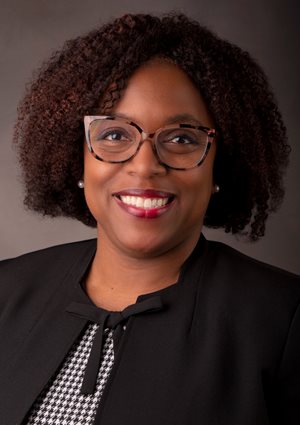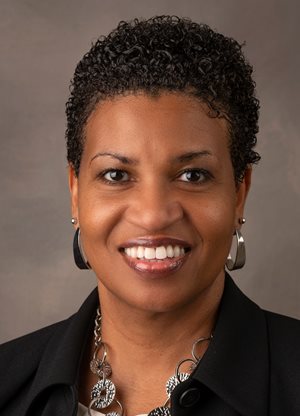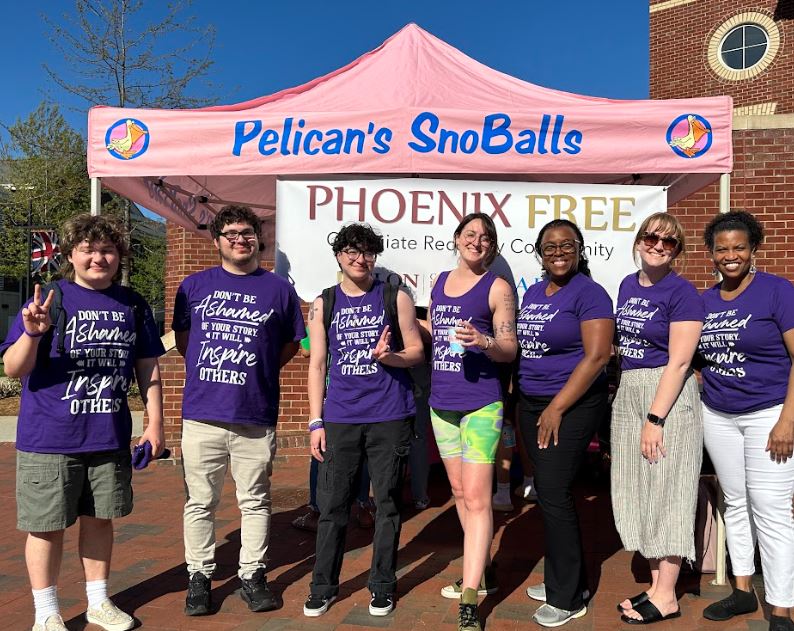Elon was one of nine higher education institutions in the state to receive a grant for the North Carolina Department of Health and Human Services in January.
Syd Danziger ’24 was overcome with emotion when they discovered that Phoenix Free, the Collegiate Recovery Program at Elon, had been granted $257,000 from the North Carolina Department of Health and Human Services. The grant was the culmination of two years of planning and was a big step forward in supporting the institution’s recovery community.
“When I found out we got the grant, I cried because it felt like we were worth it. It felt like someone else had seen how important this is,” Danziger said, who serves as the program’s president.
The grant to Campus Recreation and Wellness will enhance existing services for Phoenix Free as it seeks to support, educate and provide resources for students along their recovery journey. Elon was one of nine institutions from across North Carolina awarded the grant from the North Carolina Department of Health and Human Services to increase access to recovery services and support on campuses for students with substance use disorders.

Operating through Student Wellness Programs within Campus Recreation and Wellness, Phoenix Free offers peer-led support groups, substance-free social events and programs, and opportunities to network with other students in local and national collegiate recovery programs.
Charlotte Williams, associate director for student wellness, and Callie Kelly, assistant director for student wellness, are co-authors of the grant and will serve as co-principal investigators. Williams and Kelly credit the success of the grant application to strong institutional support. “From the onset, Vice President Jon Dooley encouraged us to apply and seek guidance from the Office of Sponsored Programs,” Kelly said.
Bonnie Bruno, director of sponsored programs, acknowledged the magnitude of this award. “The grant was a huge undertaking and marks the first time our office has received funding from the Substance Abuse and Mental Health Services Administration. This is a tremendous success for Elon,” Bruno said.
Phoenix Free has previously been funded by the Thomas D. Shaffner Charitable Foundation to specifically address substance use prevention and recovery support for students maintaining a recovery lifestyle or at risk for developing a substance use disorder.
Based on recommendations by the Association of Recovery in Higher Education, the new funding will prioritize hiring a full-time coordinator and undergraduate interns. The coordinator position will be instrumental in providing dedicated leadership and developing Phoenix Free as a model Collegiate Recovery Program. Other key project objectives include:
- Identifying and establishing a physical space
- Strengthening faculty and staff engagement opportunities
- Increasing campus-wide substance-free social programs and events

Establishing campus and community partnerships will be essential to the program’s growth and long-term sustainability of Phoenix Free. “We also hope this grant inspires advocacy,” Kelly said. “Substance misuse threatens a student’s academic success and well-being. We need more visible faculty, staff, and student allies on campus to reshape norms and perceptions about mental health and substance use disorders.”
The team will work to expand and strengthen the university’s existing programming and resources. In addition to Phoenix Free, Elon offers a comprehensive mix of prevention programs and strategies to promote informed decision-making and healthier behaviors. Other resources for students include:
- Alcohol and substance-free housing for Elon students (ASHES) Learning and Learning Community
- Alcohol Discussion Workshop
- Brief Alcohol Screening and Intervention for College Students (BASICS)
- Kognito At-Risk Training
Williams believes this grant will ensure that students in recovery or experiencing substance use challenges are supported by a continuum of equitable programs and services during their time at Elon. “This is an amazing opportunity for us to continue to foster belonging for students with lived experience,” Williams said.
Phoenix Free impact
“Recovery often deviates from the norm,” said Mary, a junior at Elon who has been involved with Phoenix Free for more than a year. Mary, who asked for anonymity, said that her “multifaceted journey of recovery” began after battling an eating disorder when she was 16 years old and includes becoming sober in January 2022. Phoenix Free provided her with a safe place to be accountable and ensure she was doing what was ultimately best for her.
“I think accountability is a big thing. A lot of people suffer in silence and the ability to sit in front of a non-judgmental group of peers and laugh and cry and support one another without judgment is wonderful,” she said. “We encourage one another to sort of tell on ourselves, keep each other accountable, keep each other on the right path.”
Like members of Phoenix Free, John Shinn shares an equal passion for collegiate recovery. Shinn is a part-time collegiate recovery specialist and certified peer recovery specialist. He was an active member of the Spartan Recovery Program as an undergraduate at the University of North Carolina at Greensboro, and with that personal background serves as an ally for current students in recovery. Shinn is working to reframe the culture around sobriety on Elon’s campus. “Students are just happy that there is more attention centered around recovery and a culture of helping other students,” Shinn added.
Danziger is especially grateful that the grant will fill a void by creating a dedicated space where students in recovery can engage openly. “We don’t have a setup, a safe place where you can go and eat snacks, do homework, watch a movie,” Danziger said. “Looking ahead … it’s especially important for students in recovery to have a home base they can come to.”
Kelly and Shinn echoed the importance of establishing a dedicated physical space for Phoenix Free. “It’s important for students in recovery to have ownership of a space – an identity space, a safe haven where they can connect,” Kelly said.
Campus partnerships
Tal Fish ‘09 is a referral coordinator within Counseling Services at Elon and has been a staff counselor since 2021. Through his counseling role, Fish has collaborated with Phoenix Free to facilitate recovery meetings, workshops, and ally training. Fish said what motivates him to do this type of work is to eliminate the shame, stigma and misunderstanding that is synonymous with substance use disorders. Fish battled an alcohol use disorder as a student at Elon and understands how isolating of an experience that can be.
Daily life on a college campus is a lonely existence for a student striving to maintain their recovery, as a recovery lifestyle is contrary to the dominant narrative of college drinking, Fish said. “If we were to have a more open conversation where we stopped normalizing harmful levels of use and started talking more openly and honestly about addiction, that would reduce some of the stigma, too,” Fish said.

The awarding of this grant to bolster the Phoenix Free program is cause for excitement that momentum is shifting in the right direction and can help eliminate that sense of isolation. But there is a lot of granular individual work that must be done to eradicate the stigma so those affected don’t feel as though they are alone in carrying this burden, those involved in the effort said. Many students fear that speaking up and expressing worry for themselves when it comes to substance misuse will only further isolate them.
“And that’s where having something like Phoenix Free on a college campus is amazing,” Fish said. “There is a space here for you. The university cares about this. There is effort and intention being put into making sure that you feel safe here.”
Kelly believes that collegiate recovery is ultimately about saving lives. Phoenix Free began with one student in fall 2020 and in such a short time has evolved into a small group of students creating groundbreaking change, she said. “Their commitment to recovery and building a community at Elon is inspiring,” Kelly said. “I’ve witnessed it. Recovery support can make all the difference in a young person’s life.”
The grant will operate through June 2024 with a possible extension through June 2026. Williams and Kelly will receive ongoing grant technical assistance provided by Addiction Professionals of North Carolina and the director of Scholastic Recovery. Campus Recreation and Wellness anticipates that the job posting for the new coordinator will be published soon.


